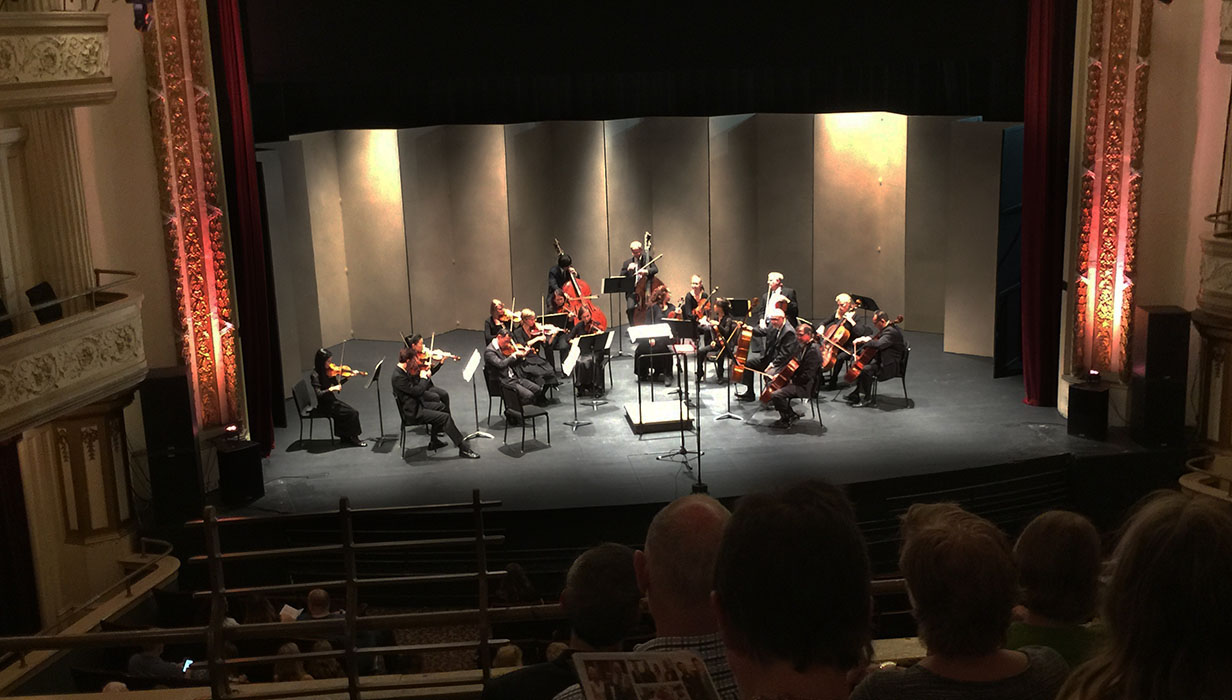Knoxville Symphony Chamber Orchestra, conducted by James Fellenbaum
Bijou Theater in Downtown Knoxville
Sunday, October 3, 2:30 PM
Josef Suk: Serenade, Op. 6, E-Flat Major
Theofanidis: Chamber Symphony No.1 (an arrangement of Tchaikovsky’s String Quartet No. 1
Tickets and Information
Last week, the Knoxville Symphony Orchestra opened its Masterworks season with a very memorable concert that set the stage for a 2021-22 that should be an important year of music for Knoxville audiences. This coming Sunday afternoon, resident conductor James Fellenbaum and the Knoxville Symphony Chamber Orchestra continue the season openings with a concert in the Chamber Classics Series of three works: the string orchestra version of Jessie Montgomery’s Strum from 2012, Josef Suk’s Serenade in E-flat, Op. 6, and Christopher Theofanidis’ Chamber Symphony No. 1, a work taken from Tchaikovsky’s String Quartet No. 1.
Maestro Fellenbaum offered: “This is going to be a beautiful and exciting program this Sunday! Jesse Montgomery’s Strum is a really cool work, and the Tchaikovsky Chamber Symphony arrangement is a wonderful creation by Christopher Theofanidis. And I look forward to conducting the Suk once again, as it was one of the pieces on my debut concert in the Chamber Classics series back in 2009.”

Jessie Montgomery is a composer gradually (and deservedly) becoming known to KSO listeners. Her work Starburst has been performed a couple of times recently in Knoxville, including a 2018 performance by the KSO. Her work on this concert, Strum, grew out of a string quintet that also had life as a quartet written for the Providence String Quartet and guests.
“Within Strum,” Montgomery says, “I utilized texture motives, layers of rhythmic or harmonic ostinati that string together to form a bed of sound for melodies to weave in and out. The strumming pizzicato serves as a texture motive and the primary driving rhythmic underpinning of the piece. Drawing on American folk idioms and the spirit of dance and movement, the piece has a kind of narrative that begins with fleeting nostalgia and transforms into ecstatic celebration.”
The Czech composer and violinist Josef Suk had the ideal musical upbringing. Born into a musical family, Suk entered the Prague Conservatory at age 11. Suk wrote the Serenade for Strings in E-flat at age 18 in response to the chiding of his mentor, Antonin Dvorák, “to write something lively for a change.” Suk not only became Dvorák’s favorite pupil, but also a close personal friend, later marrying Dvorák’s daughter Otilie. Over the four movements, the work opens with a charming lyricism, intensifies with emotion, and ends energetically.
Contemporary composer Christopher Theofanidis should be familiar to KSO audiences due to the inclusion of his works (Muse, Dreamtime Ancestors, and Rainbow Body) on concerts going back a number of years.
“I have always been a great admirer of Tchaikovsky’s music and his brilliant orchestration,” offers Theofanidis in his own notes, “and so it was a real pleasure for me to explore this string quartet and his style of orchestration more generally … A transcription of this nature presents certain challenges, not the least of which is that this small orchestra was not a medium that Tchaikovsky himself worked in … One clue for me, however, turned out to be Tchaikovsky’s love of Mozart. Although Tchaikovsky didn’t entirely respect the classical sound when he arranged Mozart’s music in his Suite No. 4 (Mozartiana), there are enough clues to show what Tchaikovsky loved in that clean sound world, and that was an important key for me. I think this early string quartet does translate quite well into a symphonic form, and I was so delighted to be involved.”







